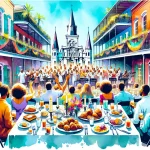The Bayou Classic, an annual college football game between Grambling State University and Southern University, transcends the realm of sports; it’s a celebration of culture, community, and tradition in New Orleans. This iconic event, which began in 1974, attracts over 200,000 visitors to the city each year, generating an estimated $50 million in economic impact. The week-long festivities surrounding the Bayou Classic showcase the rich heritage of Historically Black Colleges and Universities (HBCUs) and have become an integral part of New Orleans’ cultural fabric.
In This Article
TL;DR
- The Bayou Classic is a highly anticipated annual football game between two renowned HBCU rivals.
- It sparks a week of cultural events that significantly impact New Orleans economically and socially.
- The halftime show, featuring the universities’ marching bands, is a highlight of the weekend.
Historical Overview of the Bayou Classic
The rivalry between Grambling State and Southern University dates back to 1932, when the two teams first met on the gridiron. However, it wasn’t until 1974 that the Bayou Classic was officially established, moving the game to a neutral site in New Orleans. Over the years, the Bayou Classic has become a showcase for the best of HBCU football, with legendary coaches like Eddie Robinson of Grambling State and Pete Richardson of Southern University leading their teams to victory.
The Bayou Classic has faced challenges, such as the impact of Hurricane Katrina in 2005, which forced the game to be played in Houston temporarily. Despite these setbacks, the event has persevered and continues to grow in popularity, attracting fans from across the country and garnering national media attention.
Cultural Significance
The Bayou Classic is more than just a football game; it’s a celebration of HBCU culture and the African American community. The event brings together alumni, students, and supporters of both universities, fostering a sense of pride and camaraderie. For many attendees, the Bayou Classic is a family tradition, with generations of fans returning year after year to cheer on their favorite team and reconnect with friends and loved ones.
The week leading up to the game features a variety of events that highlight the cultural significance of the Bayou Classic, including a parade, a fan festival, and a gospel brunch. These activities provide an opportunity for the community to come together and celebrate their shared heritage, while also introducing visitors to the unique traditions of HBCUs.
Economic Impact on New Orleans
The Bayou Classic has a significant economic impact on New Orleans, with visitors spending money on hotels, restaurants, and other local businesses. In 2016, the event generated an estimated $50 million in economic activity, supporting jobs and tax revenue for the city.
The hospitality industry, in particular, benefits from the influx of visitors during the Bayou Classic weekend. Hotels in the French Quarter and Central Business District often reach full occupancy, with room rates increasing significantly. Restaurants, bars, and shops also see a surge in business, as fans explore the city and enjoy its famous cuisine and nightlife.
The Role of Music and Entertainment
The Battle of the Bands
One of the most anticipated aspects of the Bayou Classic is the halftime show, which features a battle of the bands between the Grambling State “Tiger Marching Band” and the Southern University “Human Jukebox.” These world-renowned marching bands are known for their high-energy performances, intricate choreography, and showmanship.
The battle of the bands has become a spectacle in its own right, drawing thousands of fans who come just to see the musical showdown. The bands’ performances are often the highlight of the Bayou Classic weekend, with fans debating which group put on the better show long after the game has ended.
Other Musical Performances
In addition to the halftime show, the Bayou Classic features a variety of musical performances throughout the week, including concerts by national recording artists and local musicians. These events showcase the rich musical heritage of New Orleans and provide entertainment for fans of all ages.
Community and Educational Benefits
The Bayou Classic is more than just a celebration of football and music; it also provides important educational opportunities and community outreach programs. Both Grambling State and Southern University use the event as a platform to showcase their academic programs and recruit prospective students.
The universities also partner with local schools and community organizations to provide educational resources and mentorship opportunities for young people. These initiatives help to promote the value of higher education and inspire the next generation of leaders.
In addition, the Bayou Classic generates scholarship funds for students at both universities, helping to make college more accessible and affordable for deserving students. These scholarships have a lasting impact on the lives of recipients, enabling them to pursue their dreams and contribute to their communities.
Media Coverage and National Attention
The Bayou Classic has garnered significant media attention over the years, with national networks like NBC broadcasting the game to millions of viewers. This coverage has helped to raise the profile of the event and showcase the talent and dedication of HBCU student-athletes.
Media coverage of the Bayou Classic has also evolved, with social media playing an increasingly important role in how fans engage with the event. Hashtags like #BayouClassic and #BeforeILetGo allow attendees to share their experiences and connect with other fans from around the world.
The national attention generated by the Bayou Classic has also helped to challenge stereotypes and misconceptions about HBCUs, highlighting the important role these institutions play in educating and empowering African American students.
Future of the Bayou Classic
As the Bayou Classic approaches its 50th anniversary, organizers are looking to the future and exploring ways to enhance the event for fans and participants alike. This includes embracing new technologies, such as mobile ticketing and cashless payment systems, to make the experience more convenient and accessible.
The Bayou Classic also faces challenges, such as rising costs and competition from other events. However, the passion and dedication of fans, alumni, and supporters ensure that the event will continue to thrive for generations to come.
Ultimately, the future of the Bayou Classic lies in its ability to adapt and evolve while staying true to its core mission of celebrating HBCU culture and community. By embracing innovation and engaging new audiences, the Bayou Classic can continue to be a beloved tradition and a source of pride for New Orleans and the entire African American community.
The Bayou Classic takes place annually on the Saturday following Thanksgiving Day, with events and activities throughout the week leading up to the big game. The festivities are centered around the Mercedes-Benz Superdome, located at 1500 Sugar Bowl Drive, New Orleans, LA 70112. For more information on specific events, ticketing, and accommodations, visit the official Bayou Classic website at mybayouclassic.com.






